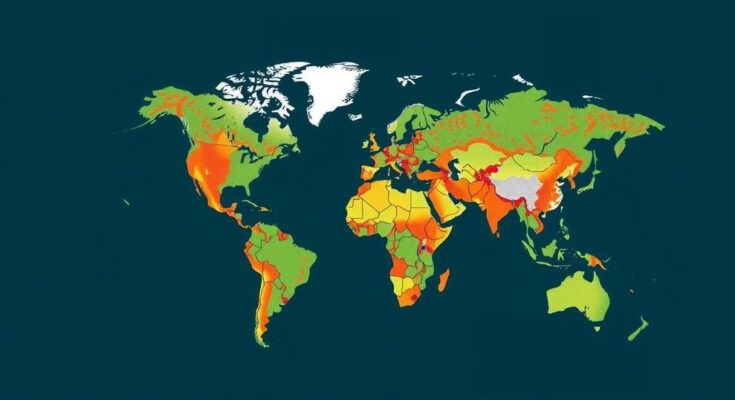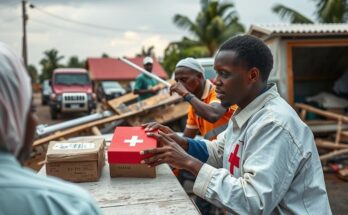The United Nations has highlighted that the current national pledges to cut greenhouse gas emissions are insufficient, projecting only a 2.6% reduction from 2019 to 2030, far below the 43% cut needed to meet the Paris Agreement’s temperature goal of limiting warming to 1.5 degrees Celsius. The urgency for countries to strengthen their commitments is underscored, especially as negotiations for a pivotal climate conference approach. Concurrently, alarming records of atmospheric carbon dioxide levels further emphasize the critical state of climate change.
The United Nations has issued a stark warning regarding the inadequacy of current national pledges aimed at reducing greenhouse gas emissions, stating that these commitments significantly fall short of what is necessary to avert catastrophic global warming. As nations prepare for the forthcoming climate negotiations scheduled for November, the United Nations Framework Convention on Climate Change (UNFCCC) revealed that the previously submitted internationally determined contributions (NDCs) project a mere 2.6% reduction in global emissions from 2019 to 2030, an improvement from last year’s 2% estimate. However, this figure is drastically less than the 43% cut deemed essential by scientists to maintain the Paris Agreement’s target of limiting temperature increases to 1.5 degrees Celsius. Simon Stiell, the UNFCCC secretary general, stressed that the current national plans leave much to be desired and underscored the urgency of delivering more robust commitments by the February deadline next year. Stiell emphasized, “Current national climate plans fall miles short of what’s needed to stop global heating from crippling every economy and wrecking billions of lives and livelihoods across every country.” The upcoming COP29 climate talks in Baku will serve as a crucial platform for negotiating a new global emissions trading system and finalizing the substantial $100 billion annual financial package designed to assist developing countries in achieving their climate targets. In a related report, the World Meteorological Organization highlighted alarming statistics regarding atmospheric greenhouse gases, noting that levels of carbon dioxide reached a record high of 420 parts per million, reflecting an increase of 2.3 ppm from the previous year. This ongoing rise, occurring at an unprecedented rate over the last two decades, poses a significant threat to global climate stability. WMO Secretary General Celeste Saulo remarked, “This should set alarm bells ringing among decision makers. These are more than just statistics. Every part per million and every fraction of a degree temperature increase has a real impact on our lives and our planet.”
The issue of national climate pledges is critical in the context of global efforts to combat climate change, notably the targets set forth in the Paris Agreement. As global temperatures continue to rise, with severe implications for ecosystems and human societies, nations are obligated to submit and update their NDCs to reflect more ambitious goals. The upcoming COP29 climate talks represent a significant opportunity for global leaders to refine their commitments and mobilize resources necessary for achieving these targets, particularly for developing nations that may face unique challenges related to climate adaptation and mitigation.
The warnings from the United Nations regarding the insufficiency of current climate pledges are a clarion call for nations to reevaluate their commitments. With only modest reductions projected, the prospects of achieving the necessary cuts to avert climate catastrophe appear grim. As global leaders prepare for critical negotiations at COP29, it is imperative that they prioritize ambitious, actionable contributions that align with scientific recommendations to safeguard the future of the planet.
Original Source: kfgo.com




